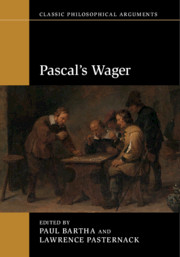Book contents
- Pascal’s Wager
- Classic Philosophical Arguments
- Pascal’s Wager
- Copyright page
- Contents
- Figures and Tables
- Contributors
- Acknowledgments
- Introduction
- Part I Historical Context and Influence
- Part II Assessment
- 6 The (In)validity of Pascal’s Wager
- 7 The Many-Gods Objection to Pascal’s Wager: A Defeat, then a Resurrection
- 8 The Wager as Decision under Ignorance: Decision-Theoretic Responses to the Many-Gods Objection
- 9 Rationality and the Wager
- 10 The Role of Pascal’s Wager in Authentic Religious Commitment
- Part III Extensions
- Bibliography
- Index
8 - The Wager as Decision under Ignorance: Decision-Theoretic Responses to the Many-Gods Objection
from Part II - Assessment
Published online by Cambridge University Press: 28 September 2018
- Pascal’s Wager
- Classic Philosophical Arguments
- Pascal’s Wager
- Copyright page
- Contents
- Figures and Tables
- Contributors
- Acknowledgments
- Introduction
- Part I Historical Context and Influence
- Part II Assessment
- 6 The (In)validity of Pascal’s Wager
- 7 The Many-Gods Objection to Pascal’s Wager: A Defeat, then a Resurrection
- 8 The Wager as Decision under Ignorance: Decision-Theoretic Responses to the Many-Gods Objection
- 9 Rationality and the Wager
- 10 The Role of Pascal’s Wager in Authentic Religious Commitment
- Part III Extensions
- Bibliography
- Index
Summary
- Type
- Chapter
- Information
- Pascal's Wager , pp. 168 - 186Publisher: Cambridge University PressPrint publication year: 2018

